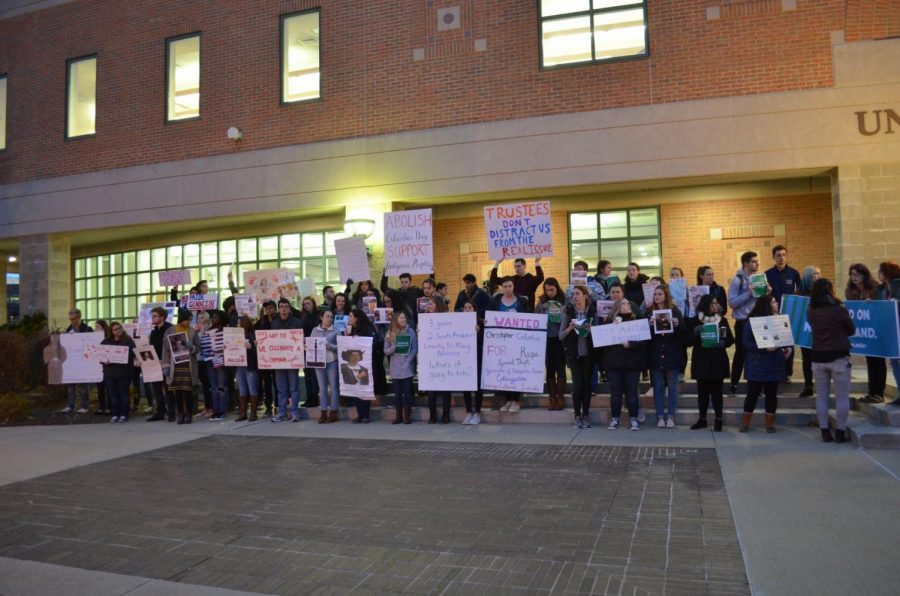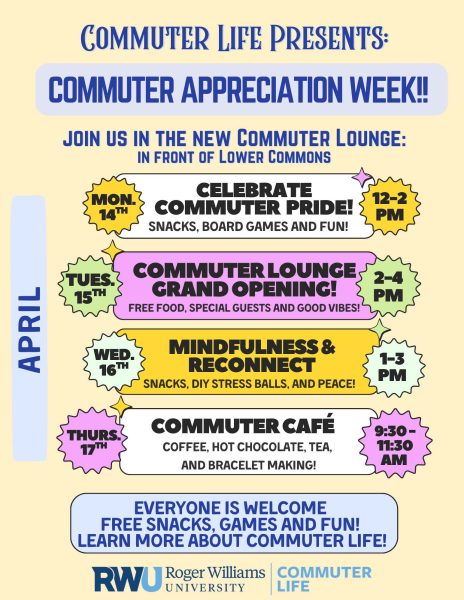Students protest in response to visiting Columbus lecturer
Across the nation, many people have expressed contention in response to the term “Indigenous People’s Day” beginning to replace “Columbus Day.” Members of Roger Williams University organized a peaceful protest outside of the Library and packed into the Mary Tefft White Center to challenge the university’s decision to keep Columbus Day on the academic calendar.
In the past, there have been student-led demonstrations, as well as a multitude of petitions on campus, that seek to raise awareness for Indigenous People’s Day and persuade RWU to recognize the holiday as such. In fact, just this year, students in several Core 102 classes have written letters to President Farish and the Board of Trustees in an effort to convince them of the importance of Indigenous People’s Day.
It was announced that visiting scholar Carol Delaney of Brown University would speak at RWU on Thursday, Nov. 30. Her lecture was centered on her own research on Christopher Columbus, and specifically what she had written in her book “Columbus and the Quest for Jerusalem: How Religion Drove the Voyages that Led to America.”
The day before Delaney’s lecture, the Indigenous People’s Day Steering Committee met to discuss matters surrounding the implementation of Indigenous People’s Day. President Donald Farish, members of the Multicultural Student Union (MSU), and university staff were present at the meeting.
Regarding the debate between Indigenous People’s Day and Columbus Day, President Farish said it was unlikely that a decision would be made until, at the earliest, March 2, 2018, which is the date of the next scheduled Board Meeting. MSU confirmed with President Farish that a peaceful protest would be held in front of the Library prior to Delaney’s lecture.
MSU said that the protest was not held against Delaney, but rather in response to the administration’s unresponsiveness to student sentiment on the topic of Indigenous People’s Day.
With the support of present university faculty and staff, students participating in the protest stood on the library steps holding handmade signs. The group went silent as President Farish, Delaney, Board members, and other members of the administration walked by.
“I’m a member of the Seekonk Wampanoag tribe and my family’s been here in this location geographically forever, and that’s the culture and the religion that I relate to,” said senior Courtney Fish. “So then coming on campus and realizing that I’m still on that territory and seeing that it’s not acknowledged in the way it should be is shocking.”
“I hope the other students and administration understand that we have a voice too, and that when we have grievances, we should be heard,” said sophomore Rachael Rooklin.
Fish said that the way that Indigenous People’s Week was handled wasn’t an accurate representation of what the students stated they wanted.
“On top of that, there weren’t as many events for Indigenous People’s Week and the education that Farish wanted in that, but yet there’s a speech regarding Columbus, without acknowledging the fact that we still need Indigenous People’s Day,” Fish continued.
The Mary Tefft White Cultural Center was filled to the brim with students, staff, and Board Members, each with their own thoughts on the debate between Indigenous People’s Day and Columbus Day.
The presentation began with Delaney detailing Columbus’ many journeys and encounters with the Indigenous Peoples of the Americas. She said that Columbus technically landed in the New World on Oct. 22 by our Gregorian calendar standards, suggesting that Indigenous People’s day perhaps be made on this date instead.
At that statement, several of the protesters lifted up their signs, voicing protests such as “we do not support genocide” and “stop making excuses.
After her lecture on Columbus, President Farish acted as a moderator for questions or statements for Delaney.
During her speech, Delaney had often said that Columbus himself did not enslave indigenous people.
During the questions segment, one student responded to this claim by citing a quote out of Columbus’ journal, which was elaborated upon by historian Howard Zinn. Columbus wrote, “With fifty men we could subjugate them all and make them do whatever we want.”
The student asked Delaney how she can defend Columbus if he wrote this down. In response, Delaney stood by her claim that he never enslaved anyone, saying that Zinn’s book was not “well researched.”
Delaney said that although she is fully in support of recognizing Indigenous Peoples through a holiday, she does not want it to replace Columbus Day.
“[The Administration has] overstepped their boundaries to stop the name change. They are using their privilege and power to silence our voices as students,” said sophomore Kat Vicente, the president of MSU. “This is our campus. We should have a say in how it is ran. I believe all the speaker did was fuel us in our fight.”





